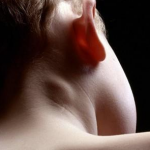An oily face is caused due to increased production of sebum by the sebaceous glands or oil glands present in the skin. The oil or sebum produced by the gland helps keep the skin moisturized and smooth.
In some cases, the sebum produced by the sebaceous glands is more than what is required to maintain the suppleness and softness of the skin. Excess oil can eventually result in a greasy shine as well as enlargement of the pores. It also facilitates the collection of dirt and grime on the skin, which then lays the foundation for development of pimples and acne. Oily skin is however less prone to developing fine lines, wrinkles, and other signs of aging.
As an oily face is more vulnerable to ugly acne and pimples, increased oil production needs to be controlled by self-care and home remedies or medical treatment if necessary. Doctors may often treat the underlying causes that trigger the glands to produce increased sebum.
Signs of an oily face
Some of the common signs and symptoms of an oily face are listed below:
- The skin on the face tends to have a perennially greasy appearance which is unattractive and dull.
- The pores on an oily face tend to be larger than normal.
- The areas along the chin and the nose as well as forehead section is more to formation of acne, pimples, and other problems associated with an oily face. This area is commonly known as the T-zone.
Causes
- In most cases, oily skin has genetic or hereditary causes. Thus, if the sebaceous glands have a predisposition to produce more sebum in the parents, then the child is also more likely to suffer from an oily face. Hereditary cases of oily skin are also more likely to experience acne, pimple breakouts, and clogged pores.
- The gland functions can also get affected by a variety of factors such as hormonal imbalance, hot weather, humidity, use of oil-based make up and cosmetics, or use of harsh cleansers or soaps.
- Hormonal changes and imbalances can increase sebum production. Hormonal problems can occur in adolescents and teens due to rising levels of androgens; in women during pregnancy, periods, and menopause; due to use of birth control pills, medicines that cause dehydration, or hormone replacement therapy; increased levels of stress that elevate androgens in the body; or due to underlying disease like PCOD/Polycystic Ovarian Disease and PCOS/Polycystic Ovarian Syndrome.
- Scrubbing excessively or application of increased amounts of skin care products, excessive use of a wash cloth or other skin care tools, over-exfoliation, and over-cleansing, etc., so as to get clearer, smoother, and younger skin can trigger an oily face. Oil production by glands can also increase via use of a product that is not suited for your skin type.
- Oil secretion can rise significantly during humid and hot weather conditions. Also, the skin becomes drier and dehydrated in winter. So the glands may overcompensate for such skin by increasing the oil production, thereby causing oily face.
- Oily face can also occur due to intake of spicy and oily foods or smoking. The latter can enlarge skin pores and promote excess oil secretion, while eating fried, oily, or junk foods can cause a greasy, shiny face.
- Sun tanning tends to de-moisturize the skin and dehydrate the body. This can trigger increased oil production to protect the surface of the skin, eventually resulting in an oily face.
Treatment of an oily face
Minor cases of an oily face can be treated with home remedies and self-care that helps control the secretion of oil by the sebaceous glands. Underlying causative medical conditions like PCOS, etc., need to be checked by a doctor.
Some home remedies to control oil production and thus prevent acne, pimple breakouts, and an oily face are as follows:
- Wash and clean the face with a mild soap or an additive or oil free cleanser, at least 3 times a day. Use an oil-free moisturizer on the face after washing it.
- Eat a healthy and balanced diet full of veggies, fruits, iron, and vitamins. Drink lots of water. Avoid foods with high levels of animal fat, chocolate, sugar, and salt, etc., and limit the intake of carbonated or alcoholic drinks.
- Use sunscreen when going out. Ensure that makeup does not stay on for a long time. Use foundations and products that are oil and moisturizer free. Regularly use bloating paper to blot out excess oil from the face.
- Steaming an oily face can help remove dirt and debris thereby opening and unclogging the pores. After steaming, use a moisturizer or mild cleanser to massage the face.
- Massaging or application of honey, cucumber juice, tea tree oil, fuller’s earth, hazel witch and lime juice paste, clay mask, aloe vera gel, milk, and sandalwood powder paste, etc., can help control oil production and thus prevent an oily face.
- Make a paste of uncooked oatmeal, lemon juice, and honey and apply on face. Wash with lukewarm water after 10 minutes to get a soft, smooth, clean, and fresh face.
